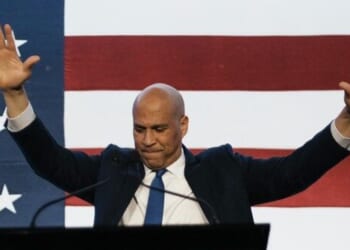
Following allegations that she lied on a mortgage application, President Trump said that he would remove Lisa Cook as a governor of the Federal Reserve System. A federal court issued a temporary restraining order keeping Cook in office, holding that, even if the allegations are true, they probably do not constitute “cause” under applicable law. Trump appealed to the Court of Appeals for the District of Columbia Circuit, which affirmed the lower court’s ruling. The president has appealed to the Supreme Court, but for now, Cook remains in her Fed position.
The case raises several important issues. First is whether Cook actually committed fraud. Some evidence suggests she did, but other evidence points the other way. Cook, like everyone else, should be presumed innocent until proven guilty.
Second is whether Trump is selectively targeting Cook. Bill Pulte, Trump’s director of the Federal Housing Finance Administration, has been apparently rooting around in the mortgage applications of the president’s perceived political enemies, hoping to find misstatements to support fraud allegations. The president not only perceives Cook to be an opponent but also wants to replace her with someone with views on monetary policy closer to his own.
The case also raises constitutional issues, such as whether the Supreme Court should overturn Humphrey’s Executor, the New Deal case that allows Congress to limit the president’s authority to remove executive-branch officials. Even if the Court did that, it must also resolve whether the president’s removal authority extends to the Federal Reserve. The Court has hinted that it considers the Fed a bank created by Congress, which suggests that Congress may be able to limit the president’s authority to remove at least some Fed officials.
One question that has received little attention thus far is whether an individual holding a responsible position in the private sector would be able to retain his position if he faced similar allegations to those against Cook. Anyone with significant experience in corporate governance knows that the answer is almost certainly no.
Probably the closest private-sector analogue to being a Federal Reserve governor is being a director of a public company, especially of a major bank. Under standard principles of corporate law, only shareholders can remove a director. While they can do so with or without cause, the process is so time-consuming and cumbersome as to be almost impracticable.
This process is rarely needed, however, as it is market practice for a director accused of serious wrongdoing promptly to resign. If he did not, his fellow directors, backed by the emphatic advice of the company’s lawyers, would pressure him to do so. The other directors might form a board committee consisting of all directors but him and then conduct the company’s business through that committee, effectively sidelining him . As a last resort, they might threaten to call a special meeting of the shareholders, who would undoubtedly vote to remove him. In any case, a director refusing to resign in such circumstances would never again be nominated to serve on a public company board.
The reasons for all this are clear. Directors serve not to benefit themselves but to increase value for the company’s shareholders. The presence of a director accused of serious wrongdoing brings negative attention to the company and distracts its managers from the business of making money. Indeed, a director who becomes a liability to the company would have a fiduciary duty to resign.
Senior executives at public companies almost always have employment agreements that let the firm terminate them either “for cause” or “not for cause.” The difference between the two is merely whether the company pays the terminated employee through his last day of service (for-cause terminations) or gives him a severance package (not-for-cause terminations).
The idea that an officer could remain in his position against the wishes of the board in the way that Cook is continuing to serve would be unthinkable in the private sector. Even if the executive’s agreement provided that he could only be terminated for cause and the company wound up terminating him without cause, he would be entitled merely to collect damages, not to remain in office.
The definition of “cause” in the private sector is a matter of negotiation, but it commonly includes “dishonesty” or “fraud,” not limited to conduct in connection with the individual’s employment (and so would include lying on a mortgage application). Note that “dishonesty” need not rise to the level of fraud, and “fraud” does not normally mean conviction, or even indictment, for the crime of fraud. “Cause” is also commonly defined to include conduct by the executive that is reasonably likely to bring the company negative publicity or embarrassment—and that, too, would almost certainly include lying on a mortgage application.
Such terminations are hardly uncommon. Earlier this month, Takeshi Niinami, chairman and CEO of Suntory, resigned amid reports that police were investigating whether he purchased illegal dietary supplements. (The supplements may have contained levels of cannabis prohibited in Japan but legal in the United States; Niinami denies any wrongdoing.) In 2024, Stefan Kaufmann resigned his post as CEO of Olympus in similar circumstances.
In granting Cook a temporary restraining order, the federal court stated that, when it considers the case on the merits, it would likely hold that “cause” under the relevant statute is limited to concerns about the individual’s “ability to effectively and faithfully execute their statutory duties, in light of circumstances that have occurred while they are in office.” That would mean that the grounds for Cook’s removal had to relate to her official acts or omissions.
If the court applies this principle, it will mean that the private sector upholds much higher ethical standards for its senior personnel than does the government. This is perhaps not surprising. Both before and after President Clinton survived the Monica Lewinsky scandal, public company CEOs lost their jobs for much less serious personal misconduct with subordinate employees.
Still, I doubt whether the court is right that cause must relate to conduct in office. Suppose someone—call him Bernie—is appointed a governor of the Federal Reserve, and it is subsequently discovered that, while running an investment fund prior to his appointment, he perpetrated the largest Ponzi scheme in history. Are the American people required to suffer Bernie to remain in office at the Federal Reserve, probably for a few years, until he is convicted and imprisoned, after which, when he finally misses a sufficient number of meetings of the Federal Open Market Committee, the president could remove him for cause? That hardly seems a rational way to run the world’s most important central bank.
Given the political stakes regarding changes in personnel in government office, it may be too much to expect that society would hold government employees to the ethical standards maintained by large corporations. In this case, Trump’s questionable motives and means, and larger issues about the independence of the Federal Reserve, complicate matters significantly. But it’s a sad commentary that a person who could not continue on the board of a company that sells alcoholic beverages or ball bearings can remain in high public office.
Photo by Drew Angerer/Getty Images


















